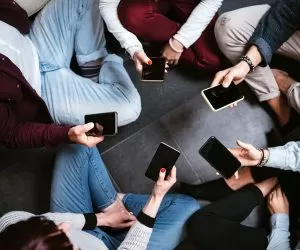12 Positive Effects of Cellphones in School
The positive effects of cellphones in school should not be ignored.
If you are a teacher thinking about banning cellphones in class – or have already done so, you should reconsider the decision.
Banning cellphones in school will make students miss out on a lot of benefits. Their usage can aid rather than hinder the learning process.
Various studies have shown that using mobile phone in schools can lead to improved learning outcomes. Students who are allowed to use cellphones will be motivated during lectures.
In this blog post, we will share reasons why cellphones should be allowed in school. After reading about the advantages of cellphones in school, you may change your mind and allow students to use them in class.
Contents
1. Help Improve Knowledge
The foremost benefit of mobiles phones in school is that they can improve the learning process. Previously, students visited the library to get extra knowledge. Now, the entire library is within the student’s pocket in the form of a cellphone.
Students no longer have to carry books in their backpacks. They can access digital version of the book on their mobile phones.
2. Enhanced Teaching Effectiveness
Mobile phones that can deliver learning content open up new possibility in teaching. With BYOD (bring your own device), schools with limited budgets won’t have to invest in tablets to offer an e-learning environment.
Students can access the teaching material through their smart phones. It will provide them with greater freedom in accessing learning material. They can play, pause, and rewind lectures. Moreover, students can look up difficult words in the dictionary instantly.
Letting students use their mobile phones in school will allow them to consult course material lectures anytime, anywhere in school. They can use the mobile phone to research, collaborate for, and contribute toward projects.
Communication with teachers will be enhanced with the use of emails, discussion boards, and online apps. Shy students who don’t ask question during class will be encouraged to ask questions online.
3. Improved Motivation to Learning
Students who are allowed to use mobile phones in class will have improved motivation in learning. They will look up topics on the net.
Letting students access study materials outside the class will result in increased motivation. The fact is a lot of students find the textbook content too limited or boring.
Students will be more motivated to learning if they are allowed to visit sites such as Khan Academy, Coursera, Udemy, Udacity, and others. This will provide a wealth of information to students who will look forward to attending each lecture.
4. Remain Organized
The impact of mobile phones on students will be beneficial since students who use cellphones can remain better organized.
Students can create an entry about an upcoming exam in the mobile phone calendar. As a result, the students will not forget to prepare for any exam.
In addition, students will manage the school work more efficiently if they are allowed to use the cell phone at the school. This will result in an improved academic performance.
5. Cost Savings for School
Letting students use cell phones in the class will result in great cost savings for the school as well. The costly textbooks can be replaced with e-books that can be accessed through the mobile phone.
Teachers won’t have to give printed handouts. Students can be asked to access the course content through their mobile phones. Moreover, teachers can ask students to give exam online.
Sites such as Examtesting.com allow teachers to create a comprehensive test online. They can create mock online exams and quizzes. Moreover, they can view cumulative performance reports about each student.
Allowing students to use mobile phones to give test online will lead to convenience to both the teacher and the students.
6.Prepare for Future Career
One of the most significant positive effects of cellphones in school is that it will prepare students for future career.
Mobile devices will be a part of the everyday life as adults.
Cellphones will be an important part in many career paths in the future. Allowing the use of mobile phones in school will help students to easily transition into the professional career.
7. Up-to-Date Information
Students who are allowed the use of cellphones in schools will have up-to-date information. They can have instant access to latest statistics, groundbreaking discoveries, and world events.
The students can confirm the stats presented in the class and update the teacher in case of any recent developments.
For instance, the world of physics was turned upside down when scientists voted to change the definition kilogram, kelvin, ampere, and mole. These changes could take months to be incorporated into the school curriculum.
However, if students are allowed to use the mobile phones in school, they will be able to get the latest and most up-to-date knowledge.
Theadvantage of bringing mobile phone to school in the form of up-to-date information should convince teachers to re-consider their decision and allow students to use phone in class.
8. Increased Teacher Student Interaction
One of the positive effects of mobile phones in school is that it leads to increased teacher-student interactivity. With apps such as TurningPoint, teachers can create interactive questions that can be answered by students.
Teachers can create surveys, assessment quizzes, and self-paced evaluations before the start of a class. Students can give the response using their mobile phone. This will help teachers gauge the learning level of students and adjust the course content accordingly.
9. Digital Textbooks Can Replace Printed Books
A significant benefit of mobile phones in schools is that digital textbooks can replace printed books. The environmental cost of printed books is too much to ignore.
Nearly 40 percent of the commercially cut trees in the world are used for paper production. Cutting of trees leads to a catastrophic impact on the environment including climate change.
Allowing students to use mobile phones in class to access digital textbooks will be the first step in reducing the negative footprint on the environment.
The digital textbooks can easily be accessed on mobile phone. Students won’t have to carry heavy backpacks to schools. The mobile phone can store hundreds of eBooks. They provide convenient access to text materials to the students.
10. Record Everything During a Lecture
Students won’t be able to get the most out of a lecture if they focus more on taking notes instead of listening. This is where mobile phones can be helpful.
An advantage of mobile phones for students in school is that iinstead of taking notes, students can take a picture of the whiteboard or make an audio recording using their cellphone. This will allow them to focus on the lecture.
The photo and audio are a good reference that students can turn to when revising.
Moreover, the image and audio recording can also be shared with an absent student. This will ensure that the entire class is on the same page and that the teacher won’t have to repeat the previous lecture.
You can also use Evernote to save pictures with a short blurb. All the pics will be kept organized so that you won’t have any difficulty in accessing the desired study material when revising.
11. Expand the Learning Environment
Allowing students to use mobile phone in the class can help expand learning outside of the class. This is another benefit of mobiles phones in school.
Students can have access to information on the net that they can look up anytime, anywhere. They can go beyond the books to expand their learning.
When students are allowed to use mobile phone, they no longer will be limited to using the net during computer lab hours. Students can look up the desired information during class or anywhere on the campus.
Students will be motivated to continue learning outside of school as well. They can communicate with international students to gain deep insights into topic studied in school. The learning will become exciting that will result in improved academic outcome.
If students are really engaged in the learning process during the class, they are likely to continue outside of class. This will instill the habit of lifelong learning. Studies won’t be seen as a boring activity that must be shunned.
12. Emergency Contact
If students are allowed to bring a mobile phone to school, the time it takes to contact a relative or loved one can be reduced.
Teachers can immediately call “dad” or “mom” listed on the mobile phone. They can notify the parents in case of an emergency situation such as an allergic reaction to know how to alleviate the condition.
The time it takes to contact a parent will be significantly less as compared to the time it takes to ask the receptionist at school to call the parents.
Students can also contact parents more quickly in case of an emergency. If a school is shut down, students won’t have to wait in line at the school phone. Calling the parents using the mobile phones will be much faster.










